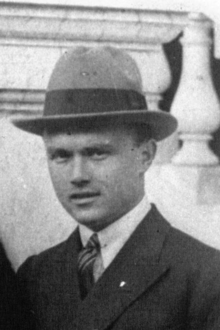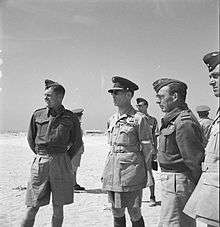Greek government-in-exile
The Greek government-in-exile was the government in exile of Greece formed in the aftermath of the Battle of Greece, and the subsequent occupation of Greece by Nazi Germany and the Fascist Italy. Due to the occupation of Greece by hostile powers and Resistance opposition, the government-in-exile exerted minimal influence inside Greece.
The government-in-exile was based in Cairo, Egypt. Hence it is also referred to as the "Cairo Government" (Greek: Κυβέρνηση του Καΐρου).
It was headed by King George II, which evacuated from Athens in April 1941, after the German invasion of the country, first to the island of Crete and then to Cairo in Egypt. It remained there until the German occupying forces withdrew from the country on 17 October 1944.
Closely controlled by the British, it was the internationally recognized Greek government, although its authority inside the country itself was minimal. There, alongside the Axis-controlled collaborationist governments, a vigorous Resistance movement developed, spearheaded by the communist-controlled EAM/ELAS, which established a de facto separate administration, formalized in March 1944 after elections in both occupied and liberated territories, as the Political Committee of National Liberation (PEEA).
History
On 25 April 1941, with the onset of the Battle of Greece, King George II and his government left the Greek mainland for Crete, which was attacked by Nazi forces on 20 May 1941. The Germans employed parachute forces in a massive airborne invasion and attacked the three main airfields of the island. After seven days of fighting and tough resistance, Allied commanders decided that the cause was hopeless and ordered a withdrawal from Sfakia.
During the night of May 24, George II and his government were evacuated from Crete to Cairo. The government remained in Egypt until the withdrawal of German forces from Greece on October 17, 1944.[1]
Government
Monarch
| Portrait | Name (Born-Died) |
Reign | |
|---|---|---|---|
| Start | End | ||
 |
King George II (1890–1947) |
3 November 1935 |
1 April 1947 |
Prime Ministers
| Portrait | Name (Born-Died) |
Term of office | Party | Cabinet | ||
|---|---|---|---|---|---|---|
| Start | End | |||||
| 1 | Emmanouil Tsouderos (1882–1956) |
29 April 1941 |
13 April 1944 |
Independent | Tsouderos | |
| 2 |  |
Sofoklis Venizelos (1894–1964) |
13 April 1944 |
26 April 1944 |
Liberal Party | Venizelos |
| 3 |  |
Georgios Papandreou (1888–1968) |
26 April 1944 |
3 January 1945 |
Democratic Socialist Party | Papandreou (National unity cabinet) |
Armed forces
- For further information, see: Greek Royal Forces in the Middle East.
